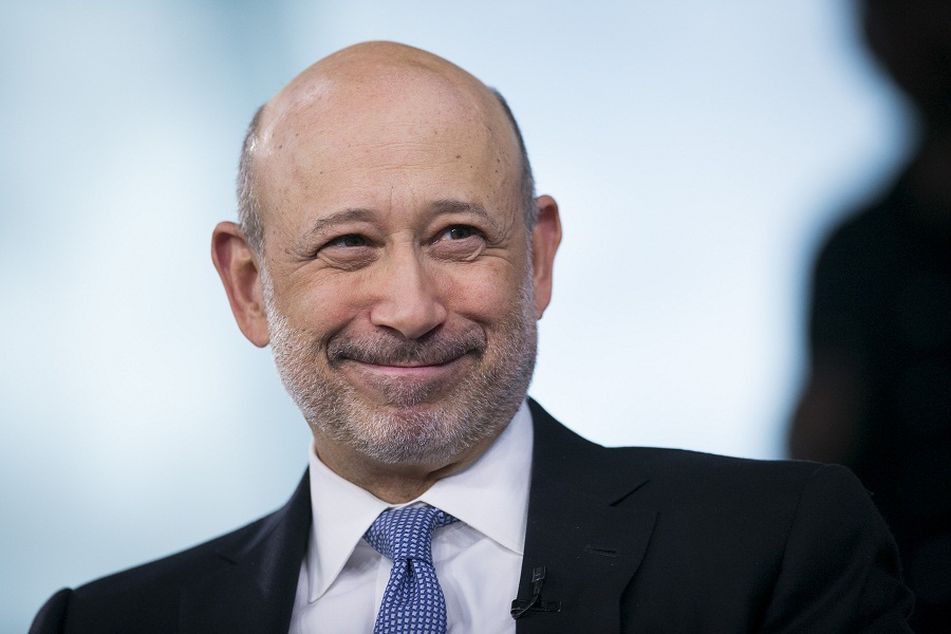Goldman’s Lloyd Blankfein joins billionaire club

The largest individual owner of Goldman Sachs stock has a stake in the company worth almost $500 million, plus real estate and a portfolio seeded by cash bonuses and distributions from the bank's private-equity funds.
Goldman Sachs Group Inc. made hundreds of partners rich when it went public in 1999. Its performance since then has turned Lloyd Blankfein into a billionaire.
The chief executive officer of the Wall Street bank for the past nine years, Mr. Blankfein has seen his net worth surge to about $1.1 billion as the firm’s shares quadrupled since the initial public offering, according to the Bloomberg Billionaires Index. As the largest individual owner of Goldman Sachs stock, he has a stake in the company worth almost $500 million. Real estate and an investment portfolio seeded by cash bonuses and distributions from the bank’s private-equity funds add more than $600 million.
For Mr. Blankfein, the son of a New York postal worker, the accumulation of wealth has been dramatic. He’s one of the few current leaders of a big global bank who reached a senior-executive rank before his firm went public. That won’t happen again anytime soon, as Goldman Sachs was the last major Wall Street firm to end its private partnership.
“It will be a rare thing,” said Alan Johnson, managing director of compensation-consulting firm Johnson Associates. “Most people won’t have as long of a career at a high level, and it’s certainly unusual to keep as much of that stock that you’ve been granted. And then, of course, the firm you work for has to be really successful.”
ENORMOUS WEALTH
Mr. Blankfein, 60, was co-head of fixed-income trading when Goldman Sachs had its IPO, an event that created enormous wealth for executives. Partners in the firm received stock valued at an average of $63.6 million at the time of the sale. Henry Paulson, the bank’s CEO before and after the IPO, had almost $600 million of stock and options when he left to become U.S. Treasury Secretary in 2006, a move that allowed him to sell his stake without paying taxes.
Shares in the firm have climbed 298% since the IPO, compared with a 6% drop in the Standard & Poor’s 500 Financials Index. The stock has doubled in the past three years, reaching its highest level since 2007.
The chief executive officer of the Wall Street bank for the past nine years, Mr. Blankfein has seen his net worth surge to about $1.1 billion
Jake Siewert, a spokesman for New York-based Goldman Sachs, wouldn’t confirm or dispute Bloomberg’s calculation. He said Mr. Blankfein declined to comment on his personal wealth.
Four current Goldman Sachs executives aside from Mr. Blankfein each own more than $175 million in company stock, including President Gary Cohn, Chief Financial Officer Harvey Schwartz, General Counsel Greg Palm and Vice Chairman John S. Weinberg, who announced his retirement this month.
At the other four major U.S. investment banks, only one current executive holds more than $50 million of company stock: JPMorgan Chase & Co. CEO Jamie Dimon. His stake accounts for almost half of his net worth of about $1.1 billion, according to the Bloomberg Billionaires Index.
TAX LAWYER
With undergraduate and law degrees from Harvard University, Mr. Blankfein worked briefly as a tax lawyer before joining J. Aron & Co. as a currency salesman in 1982. The commodities firm had been acquired by Goldman Sachs a year earlier. Mr. Blankfein rose through the trading business to the top job at the bank in 2006.
As CEO, he weathered the worst financial crisis since the Great Depression and steered the firm back from a reputational nadir, when it faced scrutiny and fines over how it sold mortgage-linked securities.
The recovery helped boost the value of Mr. Blankfein’s holdings. He owns 2.24 million shares of Goldman Sachs valued at $472 million based on Thursday’s closing price. He also has 536,582 exercisable options worth about $5 million, according to company filings.
Shares fell 0.8% Thursday after the company announced that second-quarter profit tumbled 49% on higher legal costs.
BLANKFEIN FOUNDATION
The net-worth calculation excludes unexercisable options, some restricted shares and $5.6 million in stock contributions he has made since 2001 to the Lloyd and Laura Blankfein Foundation, which has given money to Harvard, the Ethical Culture Fieldston School and other educational and arts groups. It also assumes taxes are paid at the highest rate.
Mr. Blankfein has received $167.9 million in salary and cash bonuses since 2000. Some of that — the calculation assumes 25% — as well as pay from previous years went to investments in the firm’s private-equity funds, which have provided Mr. Blankfein with more than $200 million of distributions, according to regulatory filings. He also has reaped more than $250 million from stock sales and dividends.
The after-tax proceeds from those sources would be worth $547 million if he invested the money in a blend of stocks, bonds, hedge funds, commodities and cash, assuming a weighted average annual return of 7% over the past 15 years, according to the Bloomberg Billionaires Index.
BRIDGEHAMPTON HOME
His real estate holdings are worth at least $73 million, including a 16th-floor duplex on Central Park West in Manhattan and an 8,000 square-foot, seven-bedroom Bridgehampton, New York, mansion he bought in 2012. Both properties were valued at the price he paid.
Mr. Blankfein spoke about his humble beginnings growing up in housing projects in the East New York neighborhood of Brooklyn at a graduation speech at LaGuardia Community College two years ago. His father sorted mail for the post office, working nights because of the higher pay offered on that shift. His mother was a receptionist for a burglar-alarm company, which he referred to as “one of the few growth industries in our neighborhood.”
In recent years, Mr. Blankfein has spoken about the need for public policies that promote fairer distribution of wealth while not overly crimping its creation.
“I know I’m a big fat cat, plutocrat kind of guy, but I will tell you I’ve been the beneficiary of some of these redistribution policies,” Mr. Blankfein told business school students in South Africa in April, noting he grew up in public housing and got need-based scholarships to Harvard. “Sometimes I wish I had amnesia, because there’s lots of things I’d like to forget, but that isn’t one of them.”
Learn more about reprints and licensing for this article.








